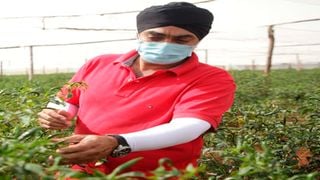
Balminder Singh Sokhi on his chilli farm in Gem, Siaya County. His produce was exported through Kisumu port last week.
Seeds of Gold
Premium
Balminder Singh, man behind the export of chilli from western Kenya
Nyabeda village in Gem, Siaya County, is not the typical place where one expects to find a horticulture produce exporter.
Being in the lake basin, fishing is the major economic activity in the area as well as subsistence growing of maize, beans and some vegetables.
But Balminder Singh, a mechanical engineer, has found Nyabeda a perfect place to grow chilli, which he farms on part of his leased10 acres.
Seeds of Gold team finds his workers sun-drying the produce. The smell of red hot chilli rents the air as the workers turn them to ensure they dry well.
“We harvested them 12 days ago and once they have the correct moisture content, we will crush them into powder or make chilli flakes,” says Singh, who is based in Kisumu.
He has planted Demon F1 variety of chilli inside shade nets on four acres. Singh started the venture in May last year after doing market research on the varieties needed for export market and their viability of growing in the region.
"At this time I was in the process of selling my machines. A friend in the UK saw on Facebook that I was selling them. He convinced me to venture into chilli farming for export," says the father of two, who got export permits from Kenya Plant Health Inspectorate Service (Kephis) and Horticultural Crops Directorate.
Drip irrigation
To start, he bought seeds and contracted a company in Naivasha to germinate them into seedlings for him.
"The seedlings were brought to my farm in Siaya after about 35 days and we planted them sometime in June having used the previous month to prepare the farm,” says the 45-year-old.

A worker dries chilli the produce on the farm.
The crop is grown using the drip irrigation system, where water is collected from a nearby spring, pumped into tanks and released to the plants.
“We have some 54,000 Demon F1 variety chilli plants grown in shade nets. For pest and disease control, we use integrated management methods where we have set up blue, yellow and white sticky traps on the farm to curb aphids, thrips and white flies.”
Singh adds:"Kephis is very strict on the issue of plant safety for the export crop. Haphazard use of pesticides is discouraged that's why we have employed four people to scout for pest and diseases on the farm daily."
He had his first harvest in September last year, picking 1,000kg to 1,500kg every week.
Thanks to good farm practices, the farmer anticipates to harvest the crop for up to 18 months.
"We feed the crops every week through the fertigation system. We offer them potassium, calcium and magnesium nitrate. This would enable us achieve the long harvesting period.”
Singh was among farmers who last week saw their fresh produce exported through the Kisumu International Airport for the first time. A cold storage facility has been set up at the Old Kisumu Airport to facilitate the export.
The storage facility comes as a relief to farmers like Singh, who have been spending more to transport their produce to JKIA in Nairobi for export.
Refrigerated truck
"Months ago, I had to take the produce in a refrigerated truck from the farm to Kenya Industrial Research and Development Institute (Kirdi) plant in Kibos, Kisumu. Then I had to organise how it would be transported by road to JKIA, which was expensive," recounts Singh, who employs seven workers.
Kephis Senior Seed Inspector Joseph Oyieko says the launch of the Kisumu cargo flight gives farmers in the Lake region an opportunity to venture into horticulture farming, particularly growing of fruits, vegetables and crops like chilli as well as flowers for the export market.
Oyieko says the region has the potential to produce chilli, avocado, mobydick flower, okra, brinjals or eggplant.
"Farmers need to diversify and grow more crops that can earn them good money. With the right guidance and paper work, it is possible to export our local vegetables for the outside market," he says. In the next five years, Singh hopes to have diversified into crops like okra, French beans and brinjals.
"We are also thinking of doing value addition for chilli by making sauces, flakes and powder for the commercial market," he says.





